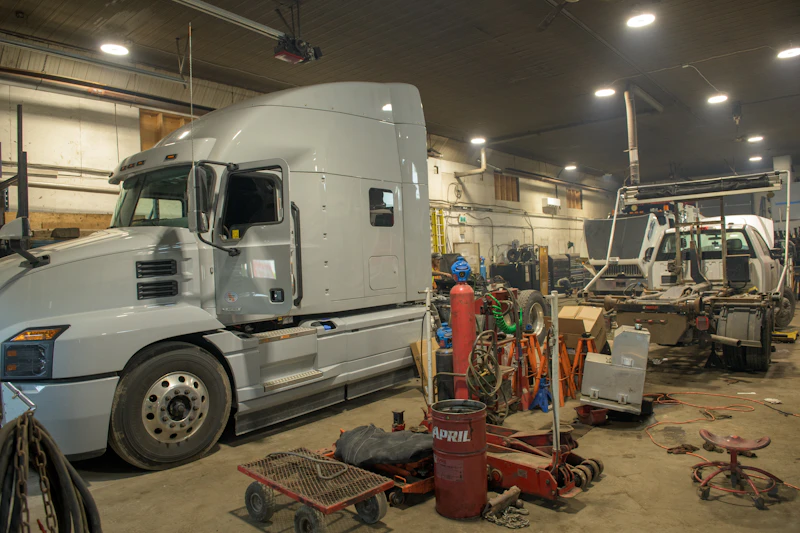5 Common Brake Maintenance Mistakes Diesel Techs See (And How to Fix Them)

Why Brake Maintenance Is More Than Just Routine
Brakes are the backbone of road safety, especially in diesel rigs carrying tens of thousands of pounds. But in the rush of fleet schedules or solo hauls, proper brake maintenance often slips through the cracks. At Saviors Repair in Pearland, TX, we frequently see preventable issues that not only wear down components but risk safety and compliance.
Let’s break down the diesel brake maintenance mistakes we see most often—along with simple, actionable fixes to help keep your truck DOT-ready and road-safe.
1. Neglecting Slack Adjusters
Manual slack adjusters require regular adjustments, while automatic slack adjusters still need periodic checks. One of the biggest mistakes techs see is assuming automatic means maintenance-free.
How to Fix It
● Inspect slack adjusters every 10,000 to 25,000 miles, depending on usage. ● For manual adjusters, check pushrod stroke length with the brakes applied. ● Replace worn-out adjusters or those that no longer hold proper tension.
In the humid climate of Pearland, Texas, road grime and moisture can cause premature wear or corrosion, making this even more critical.
2. Overlooking Brake Shoe Wear and Contamination
Brake shoes do the heavy lifting in your air brake system, yet many drivers and fleet managers neglect to check for uneven wear, glazing, or contamination from oil and grease leaks.
How to Fix It
● Perform visual inspections weekly, especially around the brake drums and backing plates.
● Replace shoes with less than 1/4-inch of lining remaining.
● Clean and degrease affected components if contamination is found.
Contaminated shoes not only reduce friction but can also damage your brake drums, leading to costlier repairs.
3. Ignoring Air System Leaks
Air brake systems are only as strong as their ability to hold pressure. Small leaks in fittings, lines, or tanks reduce performance and can lead to failed DOT inspections or out-of-service orders.
How to Fix It
● Conduct daily air leak tests during pre-trip inspections.
● Listen for hissing sounds, particularly around air chambers and lines. ● Replace worn fittings and seals immediately.
● Use soapy water to pinpoint small leaks if you're unsure of the source.
In Texas heat, rubber fittings degrade quickly—stay ahead with regular checks and quality components.
4. Failing to Lubricate Key Components
Brake hardware like S-cam bushings, rollers, and clevis pins must be greased to prevent binding and ensure smooth actuation. Dry or rusty components lead to sluggish brake response and uneven shoe wear.
How to Fix It
● Apply high-temp grease to pivot points and cam bushings during every scheduled service.
● Use a grease gun with the correct fitting size to ensure full penetration. ● Inspect components during lubrication for signs of wear or warping.
Saviors Repair techs often find that poor lubrication habits lead to premature part failure and noisy brake performance.
5. Relying Too Heavily on Automatic Systems
Modern rigs are filled with ABS and brake diagnostics, but relying entirely on sensors and dash lights is a dangerous shortcut. These systems should support maintenance, not replace it.
How to Fix It
● Never ignore ABS warning lights—address them immediately.
● Manually inspect brakes, regardless of what sensors report.
● Verify diagnostic codes with physical inspections to avoid false positives or missed issues.
Automated systems can fail or produce incorrect data, so hands-on inspections remain essential in a preventive maintenance routine.
Why Diesel Brake Maintenance Is Especially Critical in Pearland, TX
In Pearland, conditions like high humidity, urban stop-and-go traffic, and flat, fast-moving highways combine to place a unique strain on diesel brake systems. Moisture accelerates corrosion, and heavy hauling in these conditions pushes brakes to their limit. Staying vigilant with routine maintenance not only prevents wear but protects against compliance issues with Texas DOT inspections.
Learn More
When it comes to diesel brakes, the small stuff adds up quickly. A missed adjustment here or ignored leak there can compromise the entire system. By avoiding these common mistakes—like ignoring slack adjusters, skipping shoe inspections, or overlooking leaks—you can maintain a safer, more reliable truck.
If you’re ready for a full-system brake inspection or just need guidance on preventive brake care, visit Saviors Repair in Pearland, TX. Our techs are here to keep your rig safe, powerful, and DOT-compliant.

.webp)

.webp)